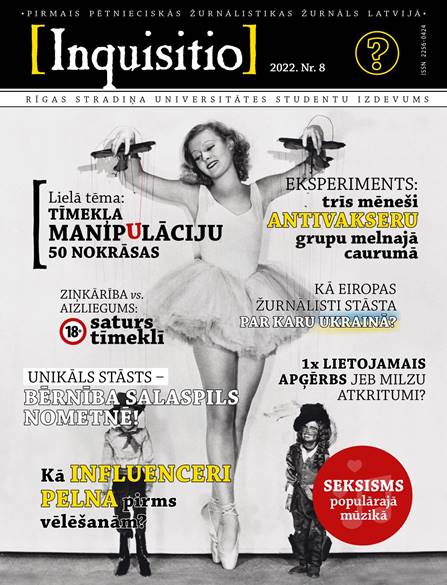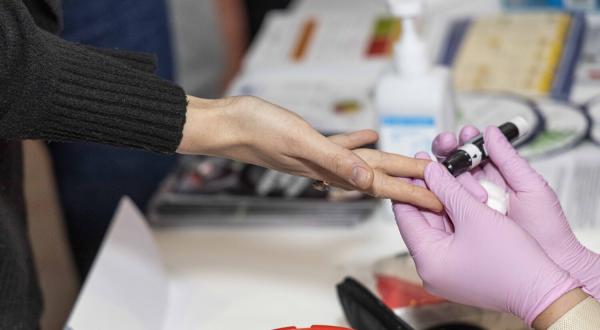RSU Students Explore Online Manipulation and Sexism in Pop Music in Inquisitio
Rīga Stradiņš University (RSU) has just published the latest issue of the investigative journalism magazine Inquisitio. The magazine was created by students from the Faculty of Communication and is edited by Anda Rožukalne, RSU professor and public media ombudsman.

Published annually, Inquisitio provides future media professionals with the opportunity to hone their interviewing, fact-finding and fact-checking, data analysis and copy-editing skills by producing investigative publications in a variety of genres.
New this year is a cooperation with the European Journalism Observatory, an international network of media research institutions. RSU has become a partner organisation, thus seeking to strengthen journalistic professionalism in Latvia. Two articles were produced this year with the involvement of the European Journalism Observatory: an analysis of new journalistic approaches on reporting on Russia’s war in Ukraine, and an interview by German journalist Olivia Samnick with Prof. Christoph Neuberger on opportunities for European media cooperation.
The latest issue of Inquisitio starts with studies on the media, including Zane Jablonska’s Master’s thesis on disinformation on Facebook. The writer draws the conclusion that media-literate audiences react to disinformation passively. The communication research section of this year’s magazine contains the most content. To write an article about vaccine sceptics’ way of thinking, Rūta Reinsone infiltrated closed groups on the instant messaging platform Telegram offering readers an insight into the symbols and narratives used by the members of such anti-vax groups as aitanāzija, #MaināmPasauli, and Vakcīnrealitāte Latvijā. Continuing in the same vein, Margarita Sēkliņa and Rūta Reinsone wrote a joint article on magical thinking and conspiracy theories on Telegram. Meanwhile, Evita Januškeviča and Megija Neimane look at influencers’ responsibility for political advertising with the Latvian parliamentary, Saeima, elections drawing closer and in another article, Kerija Broka analyses how accessible adult content is to minors together with a lawyer, representatives from the Safer Internet Centre, and a child and adolescent psychotherapist.
In the section on cultural studies, Ieva Cepliša gives an emotionally powerful of her grandmother Anna’s experience at the Salaspils Police Prison and Re-Education Through Labor Camp, and comments by historian Uldis Neiburgs provide a context to her personal experience. Another emotionally moving article is Una Eglīte’s concise account of Evelīna, a 19-year-old thymic tumour patient which can be found in the section on social issue research. The cultural studies section features an article by Kerija Broka analysing sexism and gender stereotypes in pop music as well as an interview by Madara Iverta with contemporary Latvian hip-hop icon Ansis. In the same section, Margarita Sēkliņa looks at the burden that fast fashion is placing on landfills in Latvia and the EU and how this issue fits into the EU’s environmental goals. Šarlote Ivanova from the student media network Skaļāk has written a piece on Denis, a member of the LGBTQI+ community. Another article documents an experiment about sleep quality using measurement devices and a sleep diary which shows that good sleep is important for young people. In a two-week experiment, Margarita Sēkliņa and Elizabete Ronija Dreimane explored apps such as Sleep Cycle, Sleep Tracker and Tide, while also investigating other technologies such as mattress sensors and smart watches.
The writers for Inquisitio are students from the Journalism programme at RSU, the RSU student media network Skaļāk, and members of the European Journalism Observatory. The design and layout is created by Egils Turss, the literary editors are Inga Lievīte, Ināra Mikažāne, and Indra Orleja.
Read the journal
Related news
 RSU Health Day attracts many first-time donors and large number of student research groupsFor RSU Employees, For Students
RSU Health Day attracts many first-time donors and large number of student research groupsFor RSU Employees, For Students


